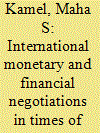| Srl | Item |
| 1 |
ID:
160082


|
|
|
|
|
| Summary/Abstract |
This article examines the geopolitical and economic implications of the Belt and Road Initiative for the Middle East. It locates the BRI within the region’s politics and examines the opportunities that the initiative offers for the region, as well as its inherent risks and challenges. It argues that the BRI is not merely an economic project as framed by Beijing, but that it represents a new stage in China’s engagement with the region, and—if fully implemented—could have wide geopolitical implications. The Middle East has the potential to contribute immensely to China’s sustained growth by addressing its energy security, supporting China’s role as a ‘megatrader’, and, more importantly, driving China’s efforts to become a global maritime power and monetary power by internationalizing the Renminbi (RMB). Thus, the BRI could have wide implications for the Middle East. Far from being a win-win project for all, the BRI will likely benefit some countries in the region more than others. Iran stands ready to benefit most. The BRI will likely increase the strategic importance of the Suez Canal and could potentially undermine the importance of some logistic hubs in the Middle East in favour of other trade hubs in Central Asia.
|
|
|
|
|
|
|
|
|
|
|
|
|
|
|
|
| 2 |
ID:
129051


|
|
|
|
|
| Publication |
2014.
|
| Summary/Abstract |
The G20 leaders met for their third summit in Pittsburgh in September 2009. They agreed to institutionalize the G20 as the premier forum for their global economic cooperation, shift 5% of IMF quota shares and 3% of the World Bank's shares from the overrepresented advanced countries to underrepresented dynamic-markets and developing countries, and continue with their fiscal stimuli and measures to sustain a durable global economic recovery following the global recession of 2008/09. More importantly, they launched negotiations on global imbalances within a newly formed G20 mechanism; the Framework for Strong, Sustainable and Balanced Growth. This article focuses on the financial negotiations that took place in this summit, with the aim of explaining how the aforementioned outcome was reached. It focuses on actors' negotiating strategies as an intervening variable explaining the outcome, and compares the strategies of three important actors: the United States, China and Germany.
|
|
|
|
|
|
|
|
|
|
|
|
|
|
|
|